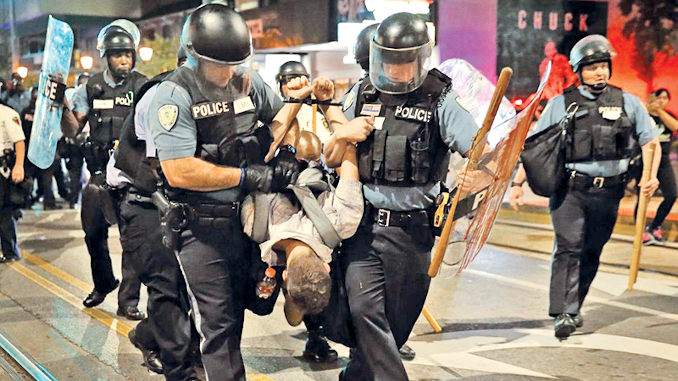
By John W. Whitehead
Just because we’re fighting an unseen enemy in the form of a virus doesn’t mean we have to relinquish every shred of our humanity, our common sense, or our freedoms to a nanny state that thinks it can do a better job of keeping us safe.
Whatever we give up willingly now—whether it’s basic human decency, the ability to manage our private affairs, the right to have a say in how the government navigates this crisis, or the few rights still left to us that haven’t been disemboweled in recent years by a power-hungry police state—we won’t get back so easily once this crisis is past.
The government never cedes power willingly.
Neither should we.
Every day brings a drastic new set of restrictions by government bodies (most have been delivered by way of executive orders) at the local, state, and federal level that are eager to flex their muscles for the so-called “good” of the populace.
This is where we run the risk of this whole fly-by-night operation going completely off the rails.
It’s one thing to attempt an experiment in social distancing in order to flatten the curve of this virus because we can’t afford to risk overwhelming the hospitals and exposing the most vulnerable in the nation to unavoidable loss of life scenarios. However, there’s a fine line between strongly worded suggestions for citizens to voluntarily stay at home and strong-armed house arrest orders with penalties in place for non-compliance.
More than three-quarters of all Americans have now been ordered to stay at home and that number is growing as more states fall in line.
Schools have cancelled physical classes, many for the remainder of the academic year.
Many of the states have banned gatherings of more than 10 people.
At least three states—Nevada, North Carolina, and Pennsylvania—have ordered non-essential businesses to close.
In Washington, D.C., residents face 90 days in jail and a $5,000 fine if they leave their homes during the coronavirus outbreak. Residents of Maryland, Hawaii, and Washington also risk severe penalties of up to a year in prison and a $5,000 fine for violating the stay-at-home orders. Violators in Alaska could face jail time and up to $25,000 in fines.
Kentucky residents are prohibited from traveling outside the state, with a few exceptions.
New York City, the epicenter of the Covid-19 outbreak in the U.S., is offering its Rikers Island prisoners $6 an hour to help dig mass graves.
In San Francisco, cannabis dispensaries were included among the essential businesses allowed to keep operating during the city-wide lockdown.
New Jersey’s governor canceled gatherings of any number, including parties, weddings, and religious ceremonies, and warned the restrictions could continue for weeks or months. One city actually threatened to prosecute residents who spread false information about the virus.
Oregon banned all nonessential social and recreational gatherings, regardless of size.
Rhode Island has given police the go-ahead to pull over anyone with New York license plates to record their contact information and order them to self-quarantine for 14 days.
South Carolina’s police have been empowered to break up any public gatherings of more than three people.
Of course, there are exceptions to all of these stay-at-home orders in more than 30 states and counting, the longest of which runs until June 10. Essential workers (doctors, firefighters, police and grocery store workers) can go to work. Everyone else will have to fit themselves into a variety of exceptions in order to leave their homes: for grocery runs, doctor visits, exercise, family visits, etc.
Throughout the country, more than 14,000 “citizen-soldiers” of the National Guard have been mobilized to support the states and the federal government in their fight against the coronavirus.
Thus far, we have not breached the Constitution’s crisis point: Martial law has yet to be overtly imposed, although an argument could be made to the contrary given the militarized nature of the American police state.
It’s just a matter of time before all hell breaks loose.
If this is not the defining point at which we cross over into all-out totalitarianism, then it is at a minimum a test to see how easily we will surrender.
Generally, the government has to show a compelling state interest before it can override certain critical rights such as free speech, assembly, press, search and seizure, etc. Most of the time, it lacks that compelling state interest, but it still manages to violate those rights, setting itself up for legal battles further down the road.
These lockdown measures—on the right of the people to peaceably assemble, to travel, to engage in commerce, etc.—unquestionably restrict fundamental constitutional rights, which might pass muster for a short period of time, but can it be sustained for longer stretches legally?
That’s the challenge before us, of course, if these days and weeks potentially stretch into months-long quarantines.
At the moment, the government believes it has a compelling interest—albeit a temporary one—in restricting gatherings, assemblies, and movement in public in order to minimize the spread of this virus.
The key point is this: While we may tolerate these restrictions on our liberties in the short term, we should never fail to be on guard lest these one-time constraints become a slippery slope to a total lockdown mindset.
What we must guard against, more than ever before, is the tendency to become so accustomed to our prison walls—these lockdowns, authoritarian dictates, and police state tactics justified as necessary for national security—that we allow the government to keep having its way in all things, without any civic resistance or objections being raised.
Most of all, don’t be naïve: The government will use this crisis to expand its powers far beyond the reach of the Constitution.
That’s how it starts.
Travel too far down that slippery slope, and there will be no turning back.
As I make clear in my book Battlefield America: The War on the American People, if you wait to speak out—stand up—and resist until the government’s lockdowns impact your freedoms personally, it could be too late.
What would be far worse, however, is handing over your freedoms voluntarily—without even a semblance of protest—to a government that cares little to nothing about your freedoms or your lives.
Constitutional attorney and author John W. Whitehead is founder and president of the Rutherford Institute. His books, Battlefield America and A Government of Wolves, are available from AFP’s Bookstore.

